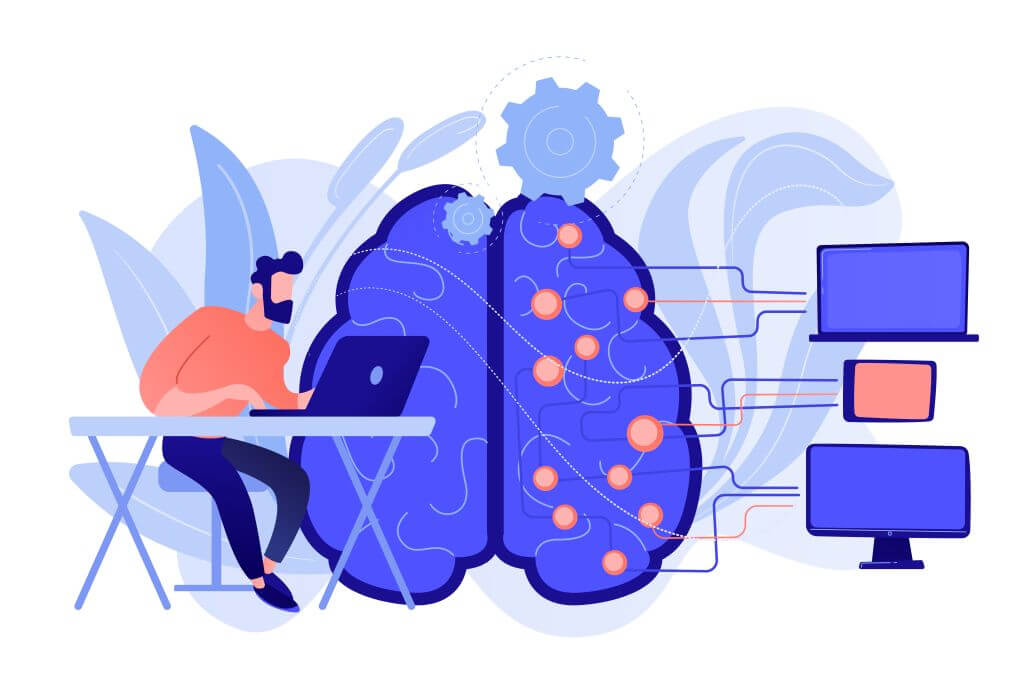Data and Marketing AI Trends to Watch in 2021

Let’s look at four data and digital marketing AI trends in the context of neural networks, machine learning, no-code AI, and intelligent automation.
Last year AI development companies hit a record mark of $33B in equity funding, according to CB Insights. As commercial applications of artificial intelligence and Big data scale at a fast pace, businesses are looking to overhaul existing marketing and data management practices to become “AI-first.”
#1. No-code AI marketing solutions
While no-code AI marketing platforms have been around for a decade, this approach is relatively nascent and gets more traction throughout 2021.
No-code and low-code AI marketing solutions provide intuitive user interfaces that allow marketers and non-tech people to build applications without coding or data engineering expertise. Through a simple “drag-and-drop” interface, you can build and deploy marketing AI models for your campaigns in hours, not weeks or even days.
For example, Microsoft’s Power Platform is a leading AI-powered enterprise BI platform for marketing and business leaders to create no-code/low-code apps and workflows.
No-code AI software enables marketing teams without IT or programming experience to integrate machine learning (ML) models into existing marketing campaigns and audience profiles, automate customer data collection and analysis, reduce time-to-market, and narrow the skills gap in artificial intelligence within the marketing department/team.
Usher, a conversational AI solution for marketing automation and customer engagement. Usher automates lead generation, sales and customer service workflows and helps understand what customers need and what to do next.

source. ushur.com
#2. Graph neural networks for targeted advertising and eCommerce recommendations
Graph neural networks (GNNs) such as TigerGraphhas and Amazon Neptune ML act as central hubs for capturing billions of highly connected datasets and building anonymous customer profiles. Multiple identifiers such as cookies, device identifiers, IP addresses, email IDs, and more provide flexibility in modeling customer behaviors and preferences across devices and marketing channels.
GNNs enable targeted advertising, privacy-compliant personalized experiences, ad fraud prevention, and overall digital marketing effectiveness. These digital marketing AI trends for 2021 prove that CMOs will get powerful tools to create audience segments for personalization throughout the year.
For example, Zeta Global data-powered marketing AI technology platform helps marketers connect with customers and prospects to drive content personalization and targeted advertising.
Activision Blizzard who uses a custom-made AI graph database with Amazon Neptune to store data from Call of Duty player journeys and create personalized multi-player engagements for millions of COD players worldwide.

Another example is Alibaba that reported significant improvements in recommendation quality and relevancy last year thanks to their AliGraph, a machine learning GNN system that powers personalized search and e-commerce recommendations for millions of Alibaba users in China.
#3. Deep learning and transformers to improve customer experiences
Deep learning models (called transformers, the first transformer was introduced by Google in 2017) analyze big sets of customer data and generate valuable marketing insights. Google’s BERT, OpenAI’s GPT series and other transformers are pre-trained models that can act in a completely unsupervised way and provide the context needed for creating personalized customer experiences.
These AI models pre-trained with millions and millions of data from the Internet can detect, understand and classify text input and generate the context for further action.
For example, it can be a chatbot or AI assistant like deana.ai that understands incoming inquiries, analyzes sentiment, and provides better services to customers 24/7.

Source: deana.ai
Deep learning and transformers will definitely help improve customer service and build better experiences in 2021 and beyond. They will humanize interactions between customers and AI-powered systems faster, easier. Besides, transformers are leading to breakthroughs in translation, text generation, summarization, question answering, VR, gaming, and more.
For example, Sapling.ai is an AI-powered writing assistant for marketing and support teams to respond to customer queries, gain conversational insights and coach teams. Sapling.ai uses the GPT-3 transformer behind the scenes to analyze conversational data and compose personalized responses.
#4. Adoption of data regulation and AI ethics
Sufficient regulation of sensitive information is top of mind for every CMO and will grow into an important category on its own as critical as any marketing or legal category in 2021. Establishing the right rules for sourcing, processing and using personal and sensitive user data is crucial for building ethical AI and preventing algorithmic bias in outcomes.
Strong data regulation is the foundation of artificial intelligence ethics. Companies may not necessarily realize what an algorithm is “seeing” in sensitive customer data or why it arrives at a certain conclusion.
To comply with regulations like GDPR and CCPA, AI development companies are proactively working on strong data governance, AI ethics, and bias monitoring. These marketing AI trends prove that businesses are interested in adopting trusted and transparent AI and data regulation practices.









